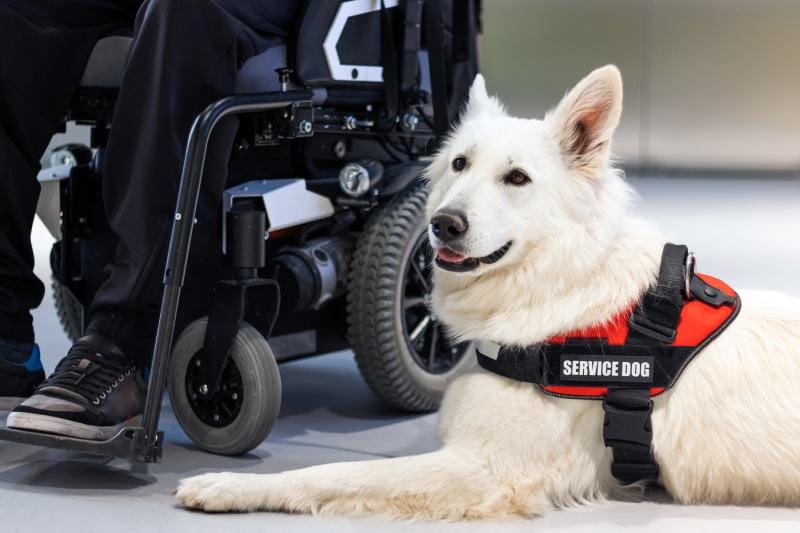Ah, pets. These furry, cute animals bring so much joy to many people’s lives. Apart from being playmates and companions, pets have been proven to provide emotional and psychological support to their owners.
According to an MHA survey, about 80% of the US households that own a pet believe that their pets provide them with emotional support1. Since animals can offer psychological and emotional support to their owners, people, especially those struggling with mental health conditions, can register their pets as emotional support animals.
There is plenty of research into the health benefits of having a companion animal but surprisingly little into emotional support animals specifically. The benefits mentioned below are extrapolated from those of having a pet.
Stick around as we explore six possible health benefits of emotional support animals.
The 6 Health Benefits of Emotional Support Animals
1. They Help Reduce Symptoms of Various Mental Illnesses
The main advantage of emotional support animals is that they help minimize the symptoms of various mental health illnesses, such as depression and anxiety.
Individuals suffering from mental health conditions may suffer from a number of difficult emotions and challenges each day. Emotional support animals may help them relax and, most importantly, not feel alone when going through these emotions and feelings.
Let’s use depression as an example. Typically, an individual suffering from depression experiences consistent sadness and lack of motivation. They may also lose interest in socializing with others and detach themselves from people. Individuals suffering from depression also frequently experience feelings of hopelessness, fatigue, and anxiety. So, how does an emotional support animal help in this case?
For starters, it helps reduce the feelings of loneliness in the individual as the emotional support animal will always be keeping them company. An emotional support animal can also restore a sense of purpose in a person suffering from depression. Knowing an animal depends on you for food and shelter can give one a sense of purpose. They provide unconditional and non-judgemental support.

2. Emotional Support Animals Promote Calmness and Relaxation in Individuals
Generally, pets promote calmness and relaxation in whoever interacts with them, which is beneficial, especially in people with mental health conditions.
Emotional support animals increase dopamine and serotonin levels in an individual, making them feel calm and relaxed. These two neurotransmitters are responsible for feeling pleasure and boosting one’s mood, respectively.
3. They Enhance Social Engagement
Another advantage of having an emotional support animal is that it enhances social engagement between the owner and other people. Let’s be honest; almost no one can resist petting a cute, cuddly animal when they see one. So, having an emotional support animal attracts people, enhancing social engagement between its owner and other individuals.

4. Decreases Feelings of Anxiety
Emotional support animals also decrease anxiety in individuals, especially those suffering from various types of anxiety disorders. Having an emotional support animal by your side, especially when those feelings of panic and anxiety creep in, is beneficial as you cuddle or pet it and feel calm and relaxed.
5. Promotes Safe and Healthy Companionship
Human relationships can often be complicated, especially for people struggling with depression, as they have less interest in socializing with others. Emotional support animals, or pets in general, promote simple but healthy companionship with their owners as the relationship is consistent and non-judgemental.
What’s more, emotional support animals allow individuals to be themselves and not put on a “false front” like they may be compelled to do when it comes to human relationships.

6. Encourages People to be More Active
Emotional support animals, especially dogs, encourage their owners to be more active as they require one to walk them regularly. Increased physical activity poses significant advantages to one’s physical and mental activity.
When it comes to physical health, regular physical activity, such as walking, lowers blood pressure and reduces the risk of heart disease. As for mental health, regular physical activity improves one’s mood as it increases the blood flow to the brain.
Emotional Support Animals vs Service Dogs: What’s the Difference?
Most people tend to confuse emotional support animals with service dogs. However, there is a significant distinction between an emotional support animal (ESA) and a service dog.
- An emotional support animal provides emotional comfort and support to individuals with psychiatric or mental health illnesses through companionship. ESAs don’t need any specific type of training, although they have to officially be recognized as emotional support animals by mental health professionals.
- On the other hand, a service dog is one that has been professionally trained to perform various tasks for individuals with a physical, mental, psychiatric, sensory, or intellectual disability. This includes reminding the owner to take their medication, retrieving items that aren’t within their reach, alerting them if their condition worsens, and so on.
- There is another group of service dogs known as psychiatric dogs. Unlike ESAs, these dogs are extensively trained to perform tasks for people with psychiatric disabilities. For instance, they can prevent an individual experiencing a dissociative episode due to a mental illness from wandering off into dangerous situations, such as traffic.
In countries like the United States, there are laws protecting the use of service dogs and emotional support animals. It is, therefore, important to familiarize yourself with the laws concerning ESAs before registering your pet as one.

Conclusion
Many people are looking for ways to cope with their mental health struggles, and having emotional support animals has become a popular way to do so. However, having an ESA isn’t as simple as getting a pet and calling it an emotional support animal.
Instead, a mental health professional should conduct the necessary analysis and give you the appropriate documentation that recognizes your pet as an ESA.
Featured Image Credit: Standret, Shutterstock
Contents
- The 6 Health Benefits of Emotional Support Animals
- 1. They Help Reduce Symptoms of Various Mental Illnesses
- 2. Emotional Support Animals Promote Calmness and Relaxation in Individuals
- 3. They Enhance Social Engagement
- 4. Decreases Feelings of Anxiety
- 5. Promotes Safe and Healthy Companionship
- 6. Encourages People to be More Active
- Emotional Support Animals vs Service Dogs: What’s the Difference?
- Conclusion











